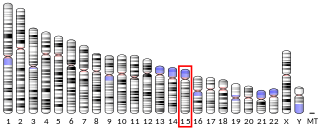
Neutral and basic amino acid transport protein rBAT is a protein that in humans is encoded by the SLC3A1 gene.

Concentrative nucleoside transporter 2 (CNT2) is a protein that in humans is encoded by the SLC28A2 gene.

Monocarboxylate transporter 5 is a protein that in humans is encoded by the SLC16A4 gene.

Neutral amino acid transporter A is a protein that in humans is encoded by the SLC1A4 gene.

Monocarboxylate transporter 8 (MCT8) is an active transporter protein that in humans is encoded by the SLC16A2 gene.

Large neutral amino acids transporter small subunit 2 is a protein that in humans is encoded by the SLC7A8 gene.

Zinc transporter SLC39A7 (ZIP7), also known as solute carrier family 39 member 7, is a protein that in humans is encoded by the SLC39A7 gene. Its fruit fly orthologue is Catsup.

UDP-galactose translocator is a protein that in humans is encoded by the SLC35A2 gene.

UDP-xylose and UDP-N-acetylglucosamine transporter is a protein that in humans is encoded by the SLC35B4 gene.

Solute carrier family 2, facilitated glucose transporter member 6 is a protein that in humans is encoded by the SLC2A6 gene.

Sodium-coupled monocarboxylate transporter 1 is a protein that in humans is encoded by the SLC5A8 gene.

Adenosine 3'-phospho 5'-phosphosulfate transporter 1 is a protein that in humans is encoded by the SLC35B2 gene.

GDP-fucose transporter 1 is a protein that in humans is encoded by the SLC35C1 gene.

Monocarboxylate transporter 1 is a ubiquitous protein that in humans is encoded by the SLC16A1 gene. It is a proton coupled monocarboxylate transporter.
The monocarboxylate transporters, or MCTs, are a family of proton-linked plasma membrane transporters that carry molecules having one carboxylate group (monocarboxylates), such as lactate, pyruvate, and ketones across biological membranes. MCTs are expressed in nearly every kind of cell.

Monocarboxylate transporter 10, also known as aromatic amino acid transporter 1 and T-type amino acid transporter 1 (TAT1) and solute carrier family 16 member 10 (SLC16A10), is a protein that in humans is encoded by the SLC16A10 gene. SLC16A10 is a member of the solute carrier family.

Monocarboxylate transporter 9 is a protein that in humans is encoded by the SLC16A9 gene.
The lactate shuttle hypothesis describes the movement of lactate intracellularly and intercellularly. The hypothesis is based on the observation that lactate is formed and utilized continuously in diverse cells under both anaerobic and aerobic conditions. Further, lactate produced at sites with high rates of glycolysis and glycogenolysis can be shuttled to adjacent or remote sites including heart or skeletal muscles where the lactate can be used as a gluconeogenic precursor or substrate for oxidation. The hypothesis was proposed by professor George Brooks of the University of California at Berkeley.

Monocarboxylate transporter 2 (MCT2) also known as solute carrier family 16 member 7 (SLC16A7) is a protein that in humans is encoded by the SLC16A7 gene. MCT2 is a proton-coupled monocarboxylate transporter. It catalyzes the rapid transport across the plasma membrane of many monocarboxylates such as lactate, branched-chain oxo acids derived from leucine, valine and isoleucine, and the ketone bodies acetoacetate and beta-hydroxybutyrate. It also functions as high-affinity pyruvate transporter.

Monocarboxylate transporter 3 (MCT3) also known as solute carrier family 16 member 8 is a protein that in humans is encoded by the SLC16A8 gene. MCT is a proton-coupled monocarboxylate transporter. It catalyzes the rapid transport across the plasma membrane of many monocarboxylates such as lactate, pyruvate, branched-chain oxo acids derived from leucine, valine and isoleucine, and the ketone bodies acetoacetate, beta-hydroxybutyrate and acetate. It also functions as high-affinity pyruvate transporter.


















